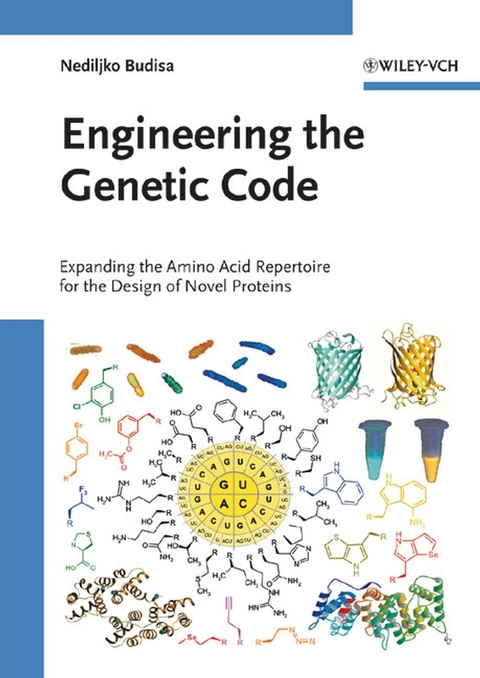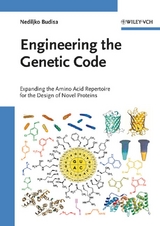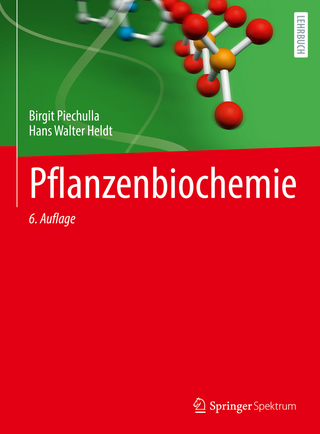Engineering the Genetic Code
Wiley-VCH (Verlag)
978-3-527-31243-6 (ISBN)
The ability to introduce non-canonical amino acids in vivo has greatly expanded the repertoire of accessible proteins for basic research and biotechnological application.Here, the different methods and strategies to incorporate new or modified amino acids are explained in detail, including a lot of practical advice for first-time users of this powerful technique.Novel applications in protein biochemistry, genomics, biotechnology and biomedicine made possible by the expansion of the genetic code are discussed and numerous examples are given.Essential reading for all molecular life scientists who want to stay ahead in their research.
Nediljko Budisa is a group leader at the Max-Planck-Institute of Biochemistry in Martinsried near Munich (Germany). He studied Chemistry and Biology at the University of Zagreb (Croatia) before joining the group of Nobel Prize Winner Robert Huber at Martinsried to obtain his PhD degree. During postdoctoral work with R. Huber and L. Moroder he led an independent research team in protein engineering. In 2004, Dr. Budisa received the BioFuture Award of the German Federal Ministry for Research and Education.
INTRODUCTION
Classical Approaches for Protein Modification
Protein Total Synthesis
Basic Definitions and Taxonomy
HISTORY OF AN EXPANDED AMINO ACID REPERTOIRE
Cell-free Synthesis of Proteins
Noncanonical Amino Acids as Tools for Studying Metabolism
Genetic Code Engineering
BASIC FEATURES OF THE CELLULAR TRANSLATION APPARATUS
Ribosome-mediated Protein Synthesis
tRNAs and tRNA Synthetases
Translational Proofreading
Ribosomal Decoding, Codon Bias and Translational Fidelity
Context-dependent Recoding
Post-translational Modifications
GENETIC CODE ORGANISATION AND PROTEIN STRUCTURE
The Universal Genetic Code
Natural Variations in Codon Assignment
Codon Reassignment and Codon Ambiguity
REPROGRAMMING THE CELLULAR TRANSLATION MACHINERY
Enzyme Specificity and Code Interpretation
Reassigning Coding and Non-Coding Units
In vitro Chemical and Enzymatic tRNA Aminoacylation
Novel Codon-Anticodon Base Pairs
Stop Codon Takover
Suppression-Based Methods
Future Approaches
IMPLICATIONS AND INSIGHTS
Evolution of the Amino Acid Repertoire
Artificial Genetic Systems
De novo Design of Organisms
Chances and Risks
APPLICATIONS FOR REPROGRAMMED CELLULAR TRANSLATION
Genetically Encoded Protein Surface Diversity
Applications in Structural Biology
Atomic Mutations
Protein Folding, Stability and Design
Tailoring Protein Spectroscopy
Protein-based Sensors
Applications in Biomedicine
Noncanonical Amino Acids with Neurological Activity
"...besticht das Buch durch seine terminologische Klarheit und transdisziplinäre Kompetenz. Es dürfte ein Gewinn sein sowohl für Interessierte an aktuellen Methoden der Molekularbiologie als auch für jene, die von der Wandelbarkeit des "universellen" genetischen Codes einfach fasziniert sind."
Nachrichten aus der Chemie
"Die umfangreiche Zahl der Beispiele belegt die neue Dimension, die das Code-Engineering erschließt. Wir können neuartige Proteine mit nicht vorhersehbaren Eigenschaften erwarten, zumal schon für Polypeptide mit den 20 proteinogenen Aminosäuren der Faltungscode ungelöst ist. Aber auch Fragen zu neuen Einsatzfeldern in Technik und Pharmakologie, zur Evolution des genetischen Codes und zur Ethik der tiefgreifenden Veränderungen, die das Code-Engineering ermöglicht, werden behandelt."
Angewandte Chemie
"Wer sich über diese brisante Materie informieren möchte, ist mit dem konkurrenzlosen Standardwerk von Budisa exzellent beraten."
Das Science Fiction Jahr - Wissenschaftsbücher 2005
| Erscheint lt. Verlag | 26.10.2005 |
|---|---|
| Sprache | englisch |
| Maße | 170 x 240 mm |
| Gewicht | 720 g |
| Themenwelt | Naturwissenschaften ► Biologie ► Biochemie |
| Naturwissenschaften ► Chemie ► Organische Chemie | |
| Schlagworte | Aminosäuren • Biochemie • Biochemie u. Chemische Biologie • Biochemistry (Chemical Biology) • biomedical engineering • Biomedizintechnik • Biotechnologie • Biowissenschaften • Cell & Molecular Biology • Cell & Molecular Biology • Chemie • Chemistry • Genetics • Genetik • Genetik / Erblehre • Life Sciences • Protein Engineering • Protein-Engineering • Proteinsynthese • Zell- u. Molekularbiologie |
| ISBN-10 | 3-527-31243-9 / 3527312439 |
| ISBN-13 | 978-3-527-31243-6 / 9783527312436 |
| Zustand | Neuware |
| Haben Sie eine Frage zum Produkt? |
aus dem Bereich




